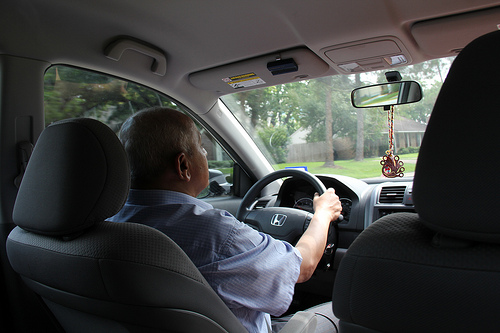BLOG

July 23, 2013
5 Warning Signs Indicating That An Elderly Person Should No Longer Drive
When a person reaches a certain age, he (or she) must seriously consider giving up driving, especially if the activity becomes more challenging because of growing health problems. Still, this is not a cause for depression. Giving up driving doesn’t necessarily mean that one is also giving up his independence. There are other ways to travel, such as using other methods of transportation, like taxis or buses, or hiring a personal driver.
Warning Signs to Watch Out For
If you are already getting on in years, here are some signs that say that maybe it’s no longer safe for you to drive.
1. Problems with Vision
For some, age greatly affects vision. The older one gets, the more distorted the sense of sight becomes. Other individuals may already have current problems, such as myopia (nearsightedness), hyperopia (farsightedness), or astigmatism. Such vision troubles can become worse with age. In case you observe that your sense of sight has become weaker, go to an ophthalmologist. Make it a habit to have a comprehensive eye exam every year as well. See if you require corrective lenses, eyeglasses, and other items that could help improve your vision while driving.
2. Failure to React Quickly
The elderly experience various physical limitations because of ailments or maybe due to medications too. Older muscles aren’t as flexible, and these also get sprained or strained more quickly. Arthritis, tendinitis and other muscle disorders, as well as nerve problems and different kinds of health troubles, including certain kinds of medications can affect one’s ability to react to stimuli as well. To illustrate, an older individual, who is suffering from a certain condition, may have a harder time looking back or dividing his attention between his driving and the road.
3. Hearing Problems
Aging also takes a toll on one’s auditory perception. If you have hearing problems, see your doctor to ask if you need hearing aids. It’s vital to hear properly because this allows you to perceive other important cues while driving. For instance, can you hear other vehicles or sense when an ambulance is fast approaching?
4. Forgetfulness and Other Problems with Memory
There is a misguided belief that memory loss is bound to happen as one ages. This isn’t necessarily so as there are many older individuals who have amazingly sharp memories. Still, if you observe that you’re becoming more forgetful or if you’re often getting lost on your way to a familiar place, then make sure to visit a specialist in order to be evaluated. Also, watch out for other lapses in memory or decision-making. For example, have you found yourself drifting onto other lanes without being aware of what you’re doing? Are you braking, accelerating or stopping your car without knowing why? Are you interpreting traffic signs incorrectly? If you notice any of these issues, subject yourself to a thorough medical evaluation to determine the problem.
5. Pain and Medications
When you grow older, you might also find yourself becoming more dependent on certain kinds of prescription drugs to manage pain and other health problems, like high blood pressure and diabetes. Be aware, however, that many kinds of medications have an effect on your physical and mental performance. Some drugs can stimulate the senses, which can also make a person more anxious or agitated. Other meds work the opposite way, which means that they dull or slow down one’s reflexes and this can make a person sluggish or unable to quickly react to emergency situations.
Citations:
Aditi Rao. “365 – 6 Driving Ms. Rao”. July 30, 2012. Online image. Flickr. July 23, 2013.
Claire Taylor is a freelancer who regularly blogs about legal issues concerning car accidents, personal injury, and other criminal charges. If you want to read more about such law-related matters, click here.

